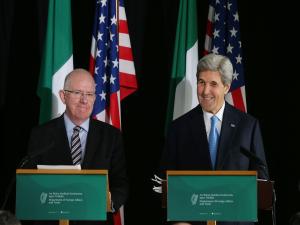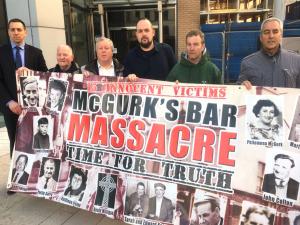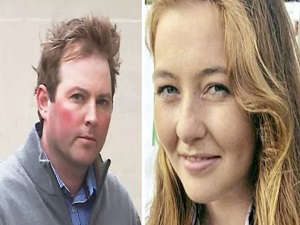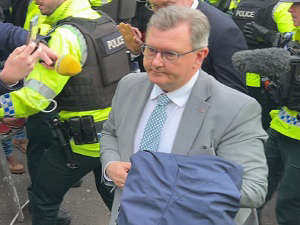
Ireland's Foreign Minister has said he is very concerned and surprised about allegations that government officials in the Republic were poaching foreign investment from Northern Ireland.
Stormont First Minister Arlene Foster levelled the claim at her Democratic Unionist Party conference on Saturday and also said concerns in Dublin about Brexit were driven by political instability.
Minister for Foreign Affairs Charlie Flanagan said he rang the Northern Ireland Economy Minister and Ms Foster's party colleague Simon Hamilton to raise the accusation.
"I'm very concerned at these remarks," he said.
Mr Flanagan also said he was "very concerned at the claim that representatives of the Irish Government where allegedly talking down the Northern Ireland economy".
He added: "I'm concerned that allegations of representatives of the Irish state were in any way poaching business."
In her speech to the DUP faithful Ms Foster said relations with Dublin were as good as they ever had been but she warned ties with the EU were not as important as the benefits of being in the UK.
Mr Flanagan addressed the row after holding talks with US secretary of state John Kerry as the key White House figure collected the Tipperary International Peace Prize for 2015.
Mr Kerry warned about risks to the Northern Ireland peace process if there are changes to the border with the Republic on the back of Brexit.
"People need to be really careful with downstream consequences, that one choice can have an impact on other aspects and whatever happens to the border, how that border access is managed," Mr Kerry said.
"It's really critical that it be done very thoughtfully and very sensitively so that it does not have any impact."
Mr Kerry declined to discuss the revived FBI investigation into emails linked to Hilary Clinton just days out from the US presidential election.
He said he had not been notified of the new inquiry in advance and that he had not been asked for information.
"As an American citizen and former nominee of the party, there is a lot I'd like to say about what is going on, but I can't and I am just going to remain out of this," he said.
The US Secretary of State also raised the war in Syria and said he hoped peace talks could begin in the next few months.
"I want to be very, very careful with any kind of prediction," he said.
"But broadly put, is it possible?
"Yes it's possible. Provided Russia and the Iranians and the regime itself are willing to accept a reasonable approach put on the table by all sides, by all the other parties, in the hopes of being able to move toward that political discourse.
"We are not going to stop, not for one day, without any shame whatsoever in saying that."
Mr Kerry said the alternative was bombs on kids, schools and hospitals.
"We have a fundamental responsibility to try to push the process forward," he said.
"My hope is that over the course of the next two or two-and-a-half months we might be able to find a way to get to the table and begin some kind of legitimate and long overdue conversation."
Mr Kerry travels on to London for talks tomorrow on the situation in Libya.
He also defended the war on Islamic State.
"It isn't easy to say but I know I speak for my country when I say we don't wander the world in search of enemies," he said.
"There are times when enemies come at us.
"Peace is not sustainable I'm afraid so long as a group like Daesh (Islamic State) about which there is nothing to negotiate.
"It is not a war between civilisations. It is a war by a nihilistic group against civilisation itself and so we have to stand up and never bow down to the doctrines of hate.
"And so in Iraq and Syria today we have to continue this fight."
On collecting the Tipperary award, Mr Kerry said: "I'm really incredibly touched, moved, very, very grateful."
Previous winners include Nobel peace prize winners Nelson Mandela and Malala Yousafzai, UN general secretary Ban Ki-moon, former president Mary McAleese and her husband Martin, and Bob Geldof.
Five groups involved in the anti-war movement in Ireland - Galway Alliance Against War, the Irish Anti-War Movement, the Peace and Neutrality Alliance, Shannonwatch and Veterans for Peace - criticised the selection of Mr Kerry for a peace award.
Mr Kerry said he was accepting the award on behalf of America, staff in the State department and White House "who labour for peace every single day".
"And for all those desperate people for whom peace can be so often be so elusive and so passionately yearned for. They are ultimately our inspiration."


 Swann refuses to rule out resigning if budget is not changed
Swann refuses to rule out resigning if budget is not changed
 Fresh inquests ordered into deaths of 15 killed in McGurk’s bomb blast
Fresh inquests ordered into deaths of 15 killed in McGurk’s bomb blast
 Trial ends after man accused of murder of young showjumper is found dead
Trial ends after man accused of murder of young showjumper is found dead
 A brief hearing and chaotic scenes as Donaldson makes first court appearance
A brief hearing and chaotic scenes as Donaldson makes first court appearance